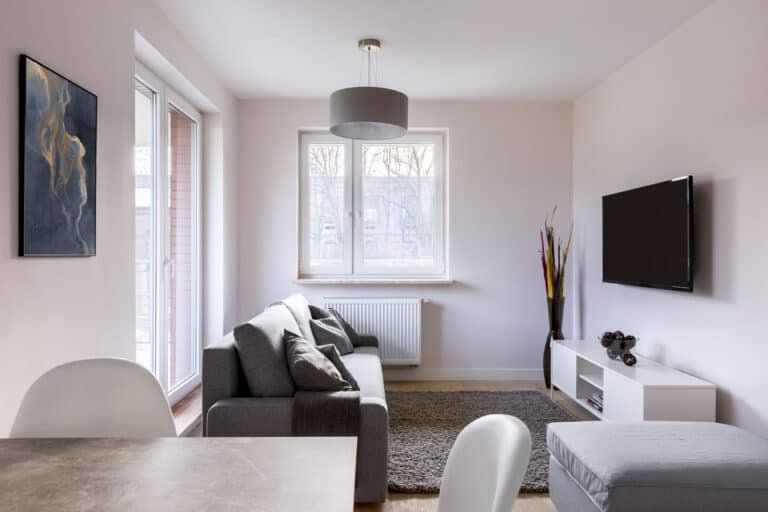Apartment Smells Like Sewage: 9 Common Sources
Homebody Forever is reader-supported. We may receive a commission if you make a purchase through a link on this post.

Recently, we had an issue with a strong sewage smell coming from our bathroom for a couple of weeks.
I have to admit, I got a little paranoid. After going down the internet rabbit hole, I’d read that there can be real health implications if the issue is sewage gas.
We had real trouble identifying it, and in the end we got the plumber in to fix it. It turned out to be an issue with the P-trap in the shower drain in our case.
But getting a plumber in turned out to be super expensive for what was a very simple fix.
If you are noticing a sewage smell in your apartment, try out the tips in this article before shelling out for a professional. You’ll need to identify the source of the smell, as these unpleasant odors can affect not only your comfort but also your health.
Related: Unexplained Sweet Smell in House
Common Sources of Sewage Smell
Drain Issues
Drain issues can be a common reason for sewage smell. When waste materials decay in your building’s sewage system, the foul odor can creep up your drains and cause a strong, unpleasant smell.
This might be a result of cracked pipes, faulty septic tanks, or other issues with your home’s sewage system. This might sound weird, but try smelling your drains around the house. You should be able to figure out pretty quick if one of them is the issue.
My advice is to start with your shower drain, this is a really common one and was the case for us.
If a specific drain is the issue it may just be a clog. Try removing the clog by using a drain snake or a chemical drain cleaner. Be sure to follow the product instructions carefully to avoid damaging your plumbing system.
Dry P-Traps
If you notice a strong sewage smell from a particular drain (and it’s not blocked), the issue could be with the P-trap. P-traps are U-shaped pipes that hold water to create a barrier between your home and the sewage gases. If the P-trap dries out, it can allow these unpleasant gases to enter your living space.
This can happen if you haven’t used the fixture connected to the P-trap for a while or during extremely hot weather. To fix this issue, simply run some water into the affected drain, as this will refill the P-trap and create a barrier against sewage smells. Make sure to regularly use your fixtures to prevent the P-traps from drying out.
You can also take out your P-trap and clean it, this might fix the issue if you notice lots of build-up.
In our case, the P-trap was actually the wrong one and wasn’t working properly so it had to be replaced. If this is the case with you, you’ll likely need a plumber to diagnose this issue.
Blocked Sewer Vents
Sewer vents play a crucial role in eliminating sewer gases and keeping your home smelling fresh. However, when these vents become blocked, sewage smell can seep into your apartment.
Blocked vents may be caused by debris, nests, or even snow and ice buildup during colder weather. Make sure to inspect and clear your sewer vents to prevent any blockages.
Check Your Toilet
One common source of sewage smells in apartments is your toilet. There are various reasons sewer odor can persist in your bathroom.
Wax Seal
A possible cause could be a damaged wax ring seal on the base of the toilet. The wax ring seals the joint between the toilet and the sewer pipe flange, stopping sewer gas from escaping. In case the seal is damaged or not installed properly, you may need to replace it to eliminate the sewage smell.
Toilet Ventilation
Ensure that your toilet is properly vented. The vent pipe carries the sewer gas above the building and releases it into the atmosphere. If the vent is blocked or improperly installed, sewage smells can accumulate in your bathroom. Contact a professional plumber to inspect the vent system and fix it if necessary.
Leaks
Lastly, look for any leaks in the toilet or surrounding plumbing. Even the tiniest leak can cause unpleasant odors to permeate the air. Inspect the toilet bowl, tank, supply valve, and surrounding pipes for any signs of leaks. If you find any, you’ll need to get it repaired as soon as possible to prevent further damage and odor problems.
Detecting Leaky Pipes
Plumbing leaks are one potential culprit for a sewage smell in your apartment. Leaking pipes can cause water to seep out and create a musty odor. To check for plumbing leaks:
- Examine visible pipes: Look for any signs of dampness, water stains, or rust on the exposed pipes throughout your apartment.
- Inspect walls and ceilings: Keep an eye out for water stains or bulging on the walls or ceilings as this could indicate a hidden leak.
- Check under sinks: Look in the cabinets under your sinks for any signs of moisture, dampness, or mold.
If you identify a leak, it’s important to address it as soon as possible. Contact your landlord or building maintenance to report the issue and get it resolved.
Checking for Blocked Vents
Blocked vents can also cause a sewage smell in your apartment. Ventilation systems help remove sewer gas, but if they become blocked or clogged, the gas can seep back into your living space. To check for blocked vents:
- Inspect vent pipes on the roof: If possible, safely access your building’s roof to examine the vent pipes. Look for any obvious signs of blockage, such as debris or nesting animals.
- Check for airflow: Hold a lit stick of incense or a smoke pen near the vent pipe openings. If there’s proper airflow, the smoke should be drawn up the vent. If it doesn’t, there may be a blockage.
- Be mindful of unusual odors: If you notice a sewage smell only during certain times, such as when using certain appliances, it could indicate an issue with the vents connected to those appliances.
If you suspect a blocked vent, notify your building manager or landlord so they can address the issue and prevent the smell from persisting.
Prevention Though Regular Drain Maintenance
To keep your apartment smelling fresh and prevent sewage smells, don’t forget to perform regular drain maintenance. That means cleaning your sink and bathtub drains on a daily basis, either with a cleaning product or with a mix of hot water and white vinegar.
Making this a habit means that bad odors and smells are unlikely to form in the first place.






